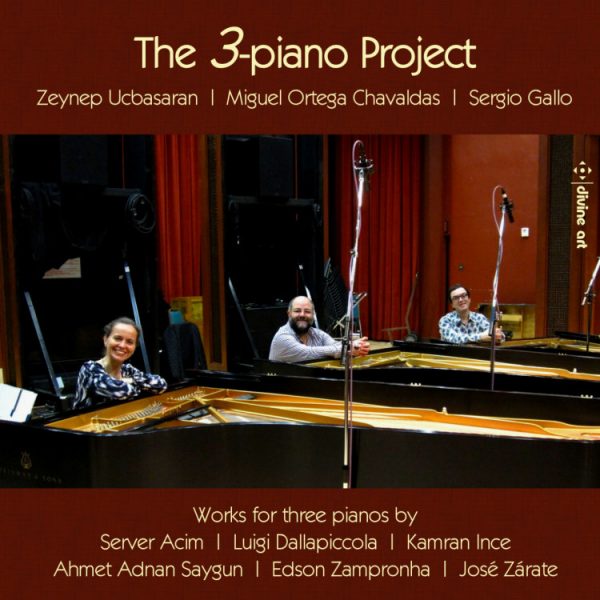Fanfare
This international project began when Zeynep Ucbasaran, Miguel Ortega Chavaldas, and Sergio Gallo—pianists who first met as students at Budapest’s Franz Liszt Academy—decided to make the first recording of Ahmet Adnan Saygun’s 1986 Poem for three pianos. To fill out the disc, they decided to commission four new three-piano works (three by composers who share the birth- countries of the pianists and one by a Turkish-American currently living in Istanbul) and to close out with a precursor in the medium, Luigi Dallapiccola’s 1935 Music for Three Pianos. The resulting recital offers a varied collection of largely unfamiliar contemporary voices. All of the newly commissioned works except the Ince, in fact, are by composers making their debut appearances in the Fanfare Archive.
At the center of the recital, appropriately, sits the Saygun. Saygun studied with d’lndy and later worked with Bartok in collecting folk materials in Turkey—but even though this is a late work, it’s the French influence that’s strongest. It’s a masterful post-impressionist, harmonically dreamy piece that relies largely on the shimmering play of color and textures, and on the back-and-forth-and-forth interplay that the three keyboards allow. There are flashes of ominousness, a moment where it seems ready to break into song, and distant recollections of march rhythms—but on the whole, it remains a reticent mood piece that evokes more than it expresses directly.
The four new pieces, all composed in 2010, are quite different—both from the Saygun and from each other. The disc begins with Server Acim’s Idea Cells (Fikir Hiicreleri). The title might summon up expectations of some forbidding post-serial work. In fact, it seems a lot closer in spirit to Bartok (especially in some of the more rhythmically vital sections) than to Boulez; and although it shifts its vision fairly often, it’s got a consistent immediacy that keeps you engaged. It’s followed by Brazilian composer Edson Zampronha’s S’io esca vivo (If I Escape Alive), which takes motivic inspiration from a madrigal by Orlando di Lasso—an even more kaleidoscopic work that interleaves gestures redolent of Minimalism, neo-Renaissance, tolling bells, bird song, again with a mesmerizing effect.
Jose Zarate’s Petit nocturne noir, cryptically “dedicated to the children of a different world,” is ostensibly more avant-garde, since, according to the notes, it’s written without bar lines and includes some aleatoric passages; but it’s a fundamentally intimate and unchallenging work, sparse in texture and unaggressive in mien. True, the notes point to a passage near the end where the pianos are “playing in unison and gradually becoming faster and louder,” but even this passage is hardly as dramatic as that description suggests. For drama, you need to turn to Kamran Ince’s Requiem for Mehmut, written in memory of composer Mehmet Aktug—a dissonant, bass-centered outpouring, relying on dark color and textural density more than rhythm or melody. It’s a desolate piece steeped in anger, and despite its obvious commitment (it’s easily the most emotional piece on the disc), I found it the least effective in the collection.
Dallapiccola’s work makes a fitting conclusion. Composed before the composer turned to serialism, it’s in three movements—a chipper Neoclassical opening that might well have been penned by Milhaud, a pained poco adagio, and a brighter, more assertive last moment that doesn’t quite erase the grief. The performances seem confident, and the decade-old sound (these recordings have been waiting since 2010 for release) gives no cause for complaint, although the anonymous program notes are far skimpier than the material deserves. All in all, recommended for explorers.
@divineartrecordingsgroup
A First Inversion Company
Registered Office:
176-178 Pontefract Road, Cudworth, Barnsley S72 8BE
+44 1226 596703
Fort Worth, TX 76110
+1.682.233.4978












